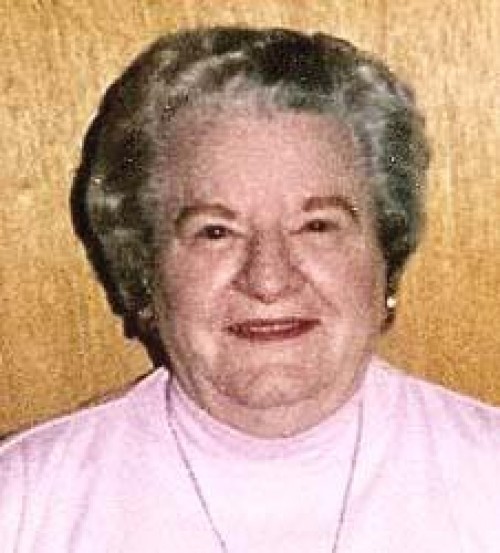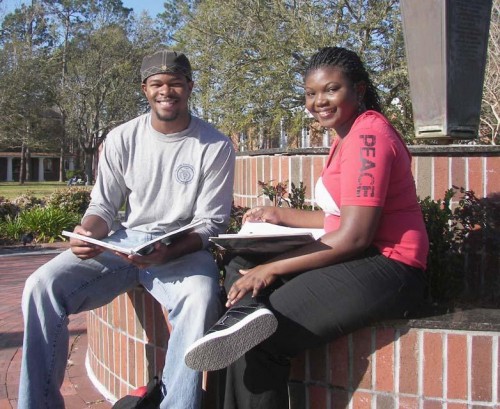Emile Joseph Bourgeois Sr.
May 25, 2009
Madeline Marie Cadiere Usie
May 29, 2009The U.S. has long been characterized as a nation of immigrants. And nowhere is the melting pot more evident than on American college campuses.
Nicholls State University is a veritable United Nations, with students from 47 different countries among its ranks.
The U.S. government authorized Nicholls to admit international students beginning in 1954. The first to arrive were French exchange students.
Today, nearly 160 students from all parts of the globe make up the campus population.
They are drawn to Nicholls in two ways, says Betty Kleen, director of graduate studies at Nicholls: through a foreign exchange agreement or direct recruitment.
They come, Kleen said, for the affordable tuition, diverse course selection and because Nicholls has a reputation for helping to guide international students through the grueling process of applying to study abroad.
“Nicholls helps the international students transition when they first come to the area,” she said. “They are very important to us because these students enhance the classroom experience. They give us great value. Our American students learn from them.”
Some foreign universities have their own tailored exchange agreement with Nicholls, where students come to the U.S. to study for a number of semesters. “We negotiate with the individual schools,” Kleen said. “Not all schools require the same thing. There are many different exchange agreements.”
Nicholls does not mandate that its American students study abroad, Kleen noted.
Foreign students who are recruited directly, most often, inquire about admissions themselves or a Nicholls recruiter canvasses international campuses seeking applicants who would be an asset to the university.
Getting to U.S. No Easy Task
The process of enrolling is long and tedious for the university and exchange students. The U.S. government has many stipulations the university must follow, said Marilyn Gonzalez, Nicholls’ assistant director for international students services.
“Compared to the process international students have to go through to gain admission into a U.S. college, American students have it easy,” she said.
U.S. college freshmen are required to have a high school transcript, a diploma and a passing score on the ACT or SAT. To continue on to graduate school, a college transcript, an undergraduate diploma and a passing score on the Graduate Record Examination are needed.
Their international counterparts are required to also pass an English proficiency exam and prove that they have adequate funds to pay for college – a U.S. government mandate.
“Most times, their parents or guardians have to sign an affidavit of support,” Gonzales said.
After successfully clearing those hurdles, Nicholls provides its OK to the federal government, which then approves the students for a visa issued at the U.S. Embassy in their country.
Generally, exchange students are issued a J-1 student visa, while students seeking a degree are given an F-1 visa, Gonzales said. The fee range for the visa varies from country to country.
Students have to obtain their student visa by visiting the American Embassy in their country.
NSU Delivers the American Experience
This semester, Nicholls has 145 foreign undergraduate and 16 graduate students among its student body. Of those, Nigerian native Ugochukwu “Ugo” Ezema, 21, earned his bachelor’s degree in biology/pre-medicine.
Driven by a desire to return to Nigeria with the skills to serve his people, Ezema is pursuing medicine as a career.
“In my country, more emphasis is placed on being a doctor, lawyer or engineer,” he said. “Anything else is looked down upon. The great thing about America is that you can be whatever you want to be. I chose some part of the medical field because I wanted to do that, not because I had to.”
Ezema, who started Nicholls at 17 years old, said the experience has been very rewarding.
“Undergraduate school here is awesome because you are exposed to so much,” he said. “The school does not just focus on your schoolwork, but they focus on your life. The instructors not only teach what you need to know to succeed in your profession, but they give you the tools to succeed in life.”
Though he was away from his native land, Ezema’s made the most of his time in the U.S. by becoming involved in many of the organizations Nicholls has to offer.
“I tried to do things that I would normally have done when I was back home,” he said. “I tried to be friendly around campus to possibly make a difference for international students because a lot of them shy away from getting involved on campus. I wanted to make their campus life a bit more socially oriented.”
Last fall, Ezema’s peers elected him Homecoming King. Most recently, he was chosen to represent the university as Mr. Nicholls 2009.
Whether he will remain at Nicholls to attend graduate school remains uncertain. Ezema said he is applying to schools across the U.S.
On the other hand, Nigerian native Abimbola “Bea” Akintunde, 26, is one of the few foreign graduate students at Nicholls. She will receive a master’s degree in business administration this December.
Akintunde initially sought an undergraduate degree at a Nigerian university, where disputes between administrators and educators are commonplace, often at students’ expense.
“Nigerian students are sometimes faced with the uncertainty of graduation because the instructors spend a lot of time protesting their administration,” she said. “Students may attend school five to seven years before they are awarded a degree in their respective studies.”
It was all the impetus a frustrated Akintunde needed to seek an opportunity to continue her schooling in the U.S.
“Here (at Nicholls), you can guarantee that you will graduate on time if you pass your courses and follow the curriculum guidelines,” she explained.
Akintunde enrolled at the University of Louisiana at Lafayette in 2003 and she was awarded a bachelor’s degree in 2007 in behavioral sciences. However, she never made use of her behavioral science degree. Instead she opted to enroll in the Nicholls MBA program.
“All my life I have been pushed toward some medical profession,” Atkintunde said. “But being in the MBA program, I did not know that I would have so much fun. I can tell you this is definitely a step in another direction for me and I am not looking back.”
Akintunde is not a social butterfly, like her Nigerian counterpart Ezema. She said her main focus was on her studies.
“I’ve learned so much about myself in such a short period of time,” she said. “I started last spring, and I am so amazed at the progress I have made as a person and a student. I didn’t know that I was capable of doing all the things that I am doing. I have to say the instructors have a way of making you realize your full potential.”
Her goal after graduate school is obtain her doctorate degree in management and marketing.
Ezema and Akintunde belong to separate tribes in their native land, Igbo and Yoruba, respectively. Though the two tribes are different and are miles a part, they both agree that surviving Bayou Country was well worth the travel from their native land.
International students have become an integral part of the makeup on Nicholls State University’s campus. Nigerian students Ugo Ezema and Abimbola Akintunde have been living in Bayou Country for some time, and both students say they love the close-knit community that surrounds the campus. “The people here are so helping and friendly,” both said.












